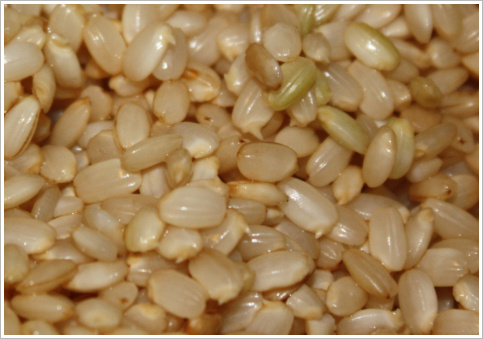| Health Benefits of Brown Rice |
Why eat brown rice?
Most of us are aware about the fact that brown rice is better than white rice. The reason that makes the brown rice stand out is the super quality and quantity of nutrients which the brown rice offers. Unlike white rice, brown rice does not go through the process of milling and polishing and hence retains its immense treasure of healthful components. The process of milling that converts brown rice into white rice strips away most of its nutritional value. |
|
Germinated brown rice
Germinated brown rice also known as 'sprouted brown rice' is another popular form of brown rice attributing to its extra-nutritious value. High nourishing content of the germinated brown rice owes to the presence of gama-aminobutyric acid (GABA). Germinated brown rice can be obtained by soaking and sprouting of the brown rice in water for a specified number of hours. This method has been considered best for obtaining the maximum amount of GABA and elevating the levels proteins and good enzymes in the germinated brown rice. The process of germination also leads to significant increase in essential components such as ferulic acid, lysine, magnesium, potassium, vitamin E, niacin, vitamin B 6, thiamine, and dietary fiber in the germinated brown rice. These released nutrients aids in better absorption during digestion and prevent intestinal irritations, inflammations and allergies. Germinated brown rice can be stored in dried form to increase its shelf life without effecting its advanced nutritional worth. |
|
How to cook brown rice?
Brown rice takes longer cooking time and requires more water because of its outer fiber coating. For one cup rice, you may use two and a half to three cups of water. Prior soaking of brown rice cuts down the cooking time. Soaked brown rice would take about 35-40 minutes to get ready. |
Nutritional Value of Brown rice
Brown rice is a natural wholesome food rich in essential minerals such as manganese, iron, zinc, phosphorous, calcium, selenium, magnesium and potassium. Vitamin wealth of brown rice includes vitamin B1 (thiamine), vitamin B2 (riboflavin), vitamin B3 (niacin), vitamin B6, folate, vitamin E (alpha-tocopherol) and vitamin K. Brown rice is a source of protein and adds good amount of fiber content to our diet. Along with this, brown rice is also a provider of health-supportive vital fatty acids.
|
|






